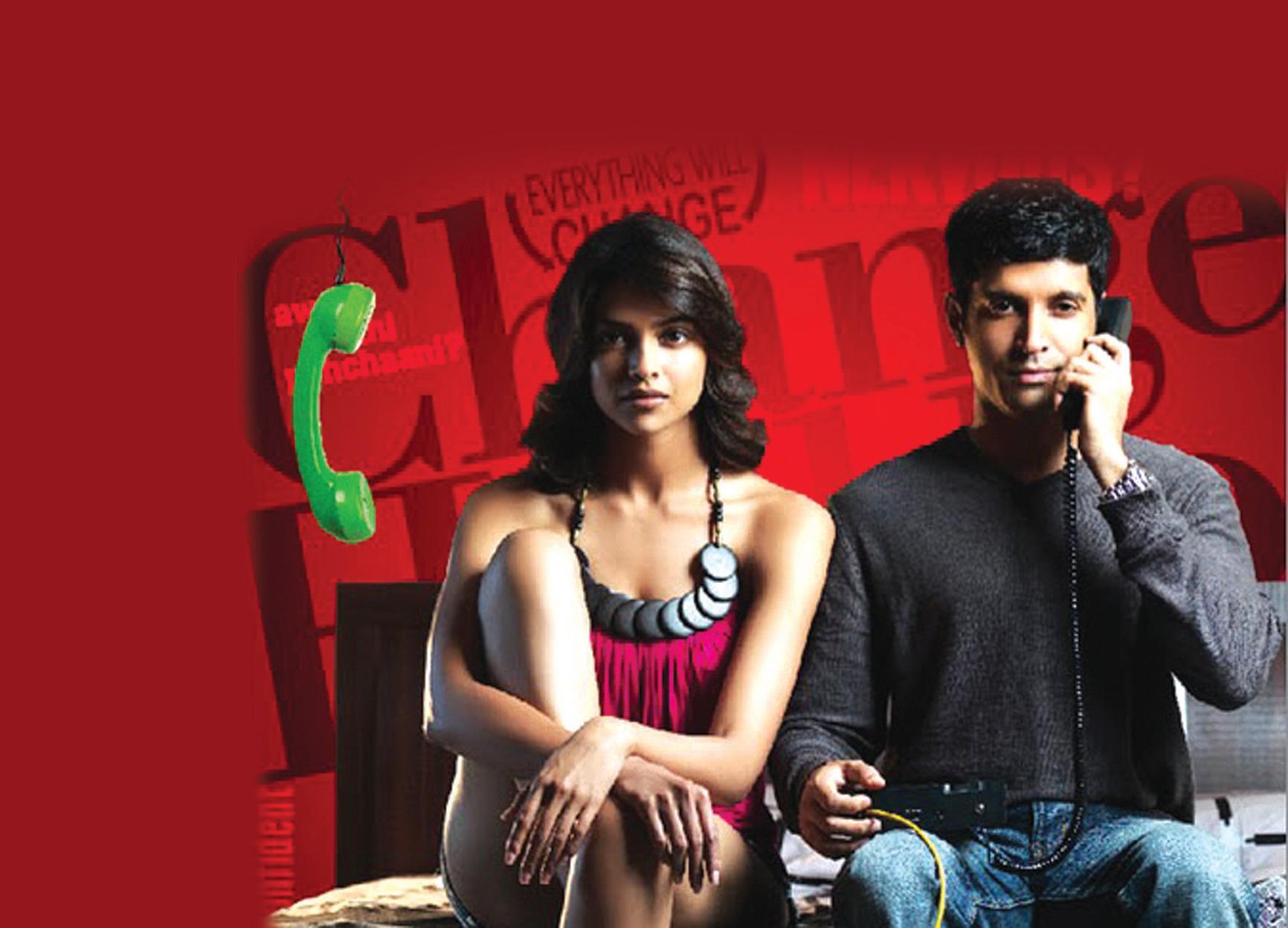
4 minute read
Cine Talk Epitomising urban anonymity
from 2010-03 Sydney (1)
by Indian Link
Film: KarthikCallingKarthik
Cast: Farhan Akhtar, Deepika Padukone
Director: Vijay Lalvani
Desolation is a distant cousin to suburban seclusion. And Karthik Calling Karthik is an interesting if flawed fable of the damned. The protagonist is Karthik (Farhan Akhtar), so timid he could merge into the woodwork of his office if only the decor was not so much glass. Karthik is bullied by his boss (Ram Kumar), sniggered at by his smarter colleagues and absentmindedly ignored by the beauty in the workplace whom Karthik gazes at sideways and writes scores of unsent e-mails to. She’s the unattainable beauty. This is the world of ‘Rocket Singh’ without the turban and the placidity. While Shimit Amin’s Rocket Singh - Salesman Of The Year was about an office-goer who craved for acceptance, Karthik just wants to be less unhappy in his space. It’s not too much to ask for. But who’s listening? Except a voice on the phone that sounds suspiciously like Karthik’s to his own ear.
The build-up of Karthik’s dreary world captures the claustrophobia of suburban existence without forgetting to add humour to the proceedings. The moments between Karthik and the gregarious Shonali (Deepika) have that touch of lively realism taken from lives we’ve known, lived and somewhere tried to reject. However, the dialogues between the couple try too hard to be ‘cool’. The relationship that Karthik develops with Shonali is far outdistanced in intensity by the one that he develops with the Chinese phone set. And after a while the ‘extended monologues’ begin to lose their credibility.
But hold on. Debutant director Vijay Lalwani, selfassured and apparently fully conscious of where
A romantic homage to Mumbai
Film: Thanks Maa
Cast: Shams Patel, Amit
Saxena, Ranjit Barot, Alok
Nath, Raghuvir Yadav, Yateen
Karyekar and Sanjay Mishra
Director: Irfan Kamal he’s taking his story, gives us a second-half that is gut-wrenching in its portrayal of the individual as an island.
He’s 12, homeless and he refuses to adopt the swaggering amorality of his friends on the street. They call him Municipal Ghatkopar because that’s the address where he was dumped as a child. But he prefers to be known as Salman Khan.
Strongly reminiscent of Mira Nair’s Salaam Bombay and far more resonantly representative of Mumbai’s slum kids than Slumdog Millionaire, Thanks Maa is a journey into lives that were born into despair.
To escape the dictatorial and tyrannical voice on the phone, Karthik buys a ticket to an unknown city which to our visual delight, turns out to be Kochi. Karthik rents a modest near-dingy room and begins life anew as a battered man seeking supreme anonymity with no telephone lines to break his selfimposed deathly stillness of existence.
The second movement of the quietly simmering plot comes to a poignant if faltering halt in a city whose tranquility the cinematographer Sanu Verghese embraces by a rejection of the urban chaos. However, the revelation on Karthik’s psychological condition surprises no one except Karthik himself, and least of all his shrink Shefali Shah.
Karthik Calling Karthik is a gripping jigsaw, piecing together a mind that plays games with itself. The winner is destiny. The pace is consciously sluggish suggesting the deep-rooted association of a vigour-less existence with the quality of life that cities offer you in exchange for a comfortable flat in a techno-suffused surrounding.
Farhan, the life and breath of the proceedings, epitomizes urban anonymity in his body language, speech and hesitant attempts to reach out to a world that has no patience with the over-sensitive. Farhan’s is indeed a super-confident performance as a man lacking self-confidence. The film itself doesn’t lack self-assurance. But the absence of what one may call an energetic exterior could well be mistaken by some viewers as ingrained inertia, a malaise that the film’s protagonist suffers from. Do not mistake the man for the plot.
Without the crutches of self-pity, debutant director Irfan Kamal enters the world of the orphaned protagonist Municipality who on one of those routine days of scavenging, stealing and hanging around with his friends waiting for the next meal, comes across an abandoned little infant.
Before we can say ‘Hey Baby’, the narration quickly swerves away from the cute and schmaltzy aspect of find-babywill-coochie-coo kind of feel-good cinema to show the gritty harsh reality of life on the relentless streets of Mumbai and how it toughens the tender ones. Real fast.
Irfan Kamal makes one helluva departure from convention. He cruises the crowded areas of Mumbai with an eye for stinging details. The film hints hectically at the savagely insensitive quality of life lived on the streets.
Our young hero refuses to be like the routine scum. “Main tere jaisa nahin hoon,” he tells his more street-wise pals, and sets off on a determined path to find the lost baby’s mother.
It’s a heartbreaking enlightening journey undertaken by the director in a spirit of adventure, discovery and tranquility. Teeming with characters, Thanks Maa still preserves a core of stirring stillness at its centre.
Often you feel Thanks Maa is a romantic homage to the unbreakable spirit of Mumbai. But then you see the bitter and brutal truth about life on the fringes, as the young brave little hero is almost molested by the warden of the reformatory played by Alok Nath.
Thanks Maa is a tender yet ruthless look at a city that claims to have a place for everyone but somehow neglects looking after children who are vulnerable to every form of attack on the streets.
Quite frequently we look at Mumbai through the eyes of the little boy and his companions as they encounter a gallery of weirdos and wackos...an alcoholic hospital attendant (Raghuvir Yadav), a dopedout cabbie (Sanjay Mishra), a paedophilic reformatory warden (Alok Nath), a cheesy incestuous upper class father (Yateen Karyekar), an imposing eunuch (Jalees Shrawani) who offers to take the baby out of Municipality’s shoulder... an offer the boy firmly refuses.
The young hero’s shock and dismay when he finally finds the baby’s mother are so palpable they reverberate in our hearts long after the film is over.
The film has its flaws, the most glaring being the constant struggle to keep the homeless children’s story credibly contoured on the bustling streets. In many sequences, the young actor Shams can be seen carrying a doll instead of a baby. Also, because of the inherently dramatic nature of the theme some of the characters and situations lose self-control.
The jagged edges do not undermine the film’s unique and thoroughly unorthodox blend of realism and social message. While the veterans pitch in brave cameos that take the narrative forward to its heartbreaking conclusion, it’s the child actors who proudly occupy centrestage. All of them are so incharacter, you wonder which came first, the slums or the camera!
Some of the editing (Amit Saxena) is uneven. But the camerawork (Ajayan Vincent) and background score (Ranjit Barot) add an extra dimension to this heartwarming tale of an orphan who won’t let another newly-born suffer his fate.
Subhash K Jha, IANS













